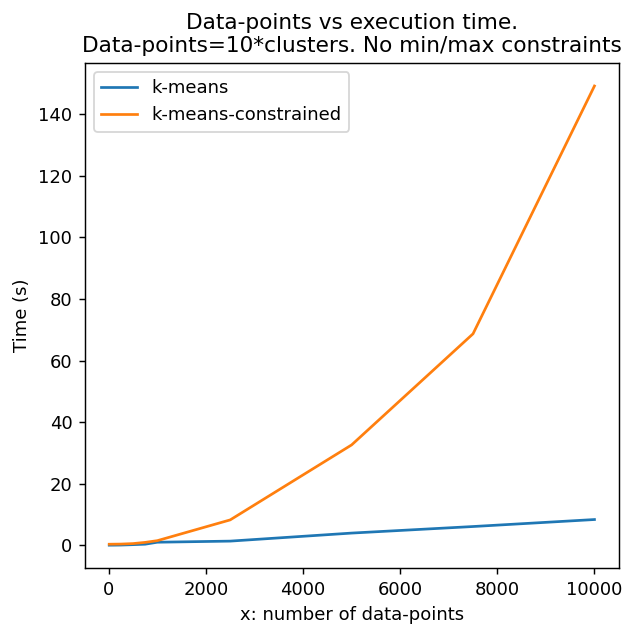
Product
Introducing Tier 1 Reachability: Precision CVE Triage for Enterprise Teams
Socket’s new Tier 1 Reachability filters out up to 80% of irrelevant CVEs, so security teams can focus on the vulnerabilities that matter.
K-means clustering implementation whereby a minimum and/or maximum size for each cluster can be specified.
This K-means implementation modifies the cluster assignment step (E in EM)
by formulating it as a Minimum Cost Flow (MCF) linear network
optimisation problem. This is then solved using a cost-scaling
push-relabel algorithm and uses Google's Operations Research tools's
SimpleMinCostFlow
which is a fast C++ implementation.
This package is inspired by Bradley et al.. The original Minimum Cost Flow (MCF) network proposed by Bradley et al. has been modified so maximum cluster sizes can also be specified along with minimum cluster size.
The code is based on scikit-lean's KMeans
and implements the same API with modifications.
Ref:
You can install the k-means-constrained from PyPI:
pip install k-means-constrained
It is supported on Python 3.10, 3.11, 3.12 and 3.13. Previous versions of k-means-constrained support older versions of Python and Numpy.
More details can be found in the API documentation.
>>> from k_means_constrained import KMeansConstrained
>>> import numpy as np
>>> X = np.array([[1, 2], [1, 4], [1, 0],
... [4, 2], [4, 4], [4, 0]])
>>> clf = KMeansConstrained(
... n_clusters=2,
... size_min=2,
... size_max=5,
... random_state=0
... )
>>> clf.fit_predict(X)
array([0, 0, 0, 1, 1, 1], dtype=int32)
>>> clf.cluster_centers_
array([[ 1., 2.],
[ 4., 2.]])
>>> clf.labels_
array([0, 0, 0, 1, 1, 1], dtype=int32)
from k_means_constrained import KMeansConstrained
import numpy as np
X = np.array([[1, 2], [1, 4], [1, 0],
[4, 2], [4, 4], [4, 0]])
clf = KMeansConstrained(
n_clusters=2,
size_min=2,
size_max=5,
random_state=0
)
clf.fit_predict(X)
clf.cluster_centers_
clf.labels_
k-means-constrained is a more complex algorithm than vanilla k-means and therefore will take longer to execute and has worse scaling characteristics.
Given a number of data points $n$ and clusters $c$, the time complexity of:
This assumes a constant number of algorithm iterations and data-point features/dimensions.
If you consider the case where $n$ is the same order as $c$ ($n \backsim c$) then:
Below is a runtime comparison between k-means and k-means-constrained whereby the number of iterations, initializations, multi-process pool size and dimension size are fixed. The number of clusters is also always one-tenth the number of data points $n=10c$. It is shown above that the runtime is independent of the minimum or maximum cluster size, and so none is included below.

1: Ortools states the time complexity of their cost-scaling push-relabel algorithm for the min-cost flow problem as $\mathcal{O}(n^2m\log(nC))$ where $n$ is the number of nodes, $m$ is the number of edges and $C$ is the maximum absolute edge cost.
If you use this software in your research, please use the following citation:
@software{Levy-Kramer_k-means-constrained_2018,
author = {Levy-Kramer, Josh},
month = apr,
title = {{k-means-constrained}},
url = {https://github.com/joshlk/k-means-constrained},
year = {2018}
}
FAQs
K-Means clustering constrained with minimum and maximum cluster size
We found that k-means-constrained demonstrated a healthy version release cadence and project activity because the last version was released less than a year ago. It has 1 open source maintainer collaborating on the project.
Did you know?

Socket for GitHub automatically highlights issues in each pull request and monitors the health of all your open source dependencies. Discover the contents of your packages and block harmful activity before you install or update your dependencies.

Product
Socket’s new Tier 1 Reachability filters out up to 80% of irrelevant CVEs, so security teams can focus on the vulnerabilities that matter.

Research
/Security News
Ongoing npm supply chain attack spreads to DuckDB: multiple packages compromised with the same wallet-drainer malware.

Security News
The MCP Steering Committee has launched the official MCP Registry in preview, a central hub for discovering and publishing MCP servers.